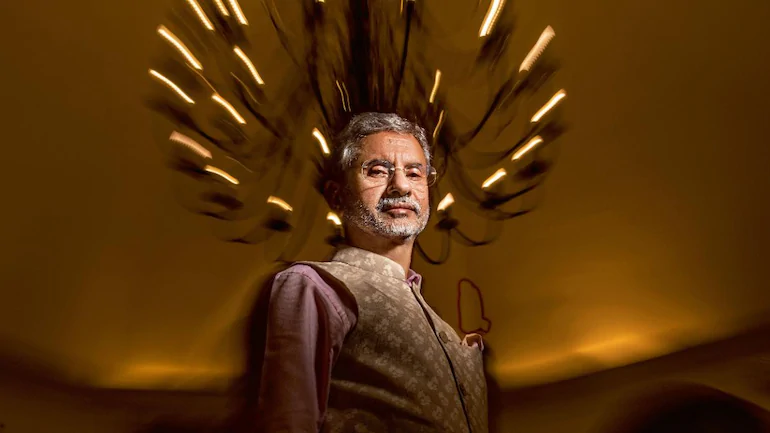
SOURCE: INDIA TODAY
Q.How does India’s way in the foreign policy that you have outlined in your book differ from that of the previous governments’? What is the new way that Modi government has charted out?
A. Part of the answer lies in what my book stresses on, an uncertain world. And by that I mean the repositioning of the US, the rise of China, the developments seen in Europe, including Brexit, a more active Russia, a more engaged Japan, a greater role for Middle powers and changing equations in the Middle East. All of this really makes for a more uncertain world along with weaker multilateralism and non-traditional trends. Part of it also lies in our own growing capacities, our growing confidence and aspirations.
So when you say what is the difference, what is the “India way”, my answer would be: No. 1, a much higher global profile, more effective shaping of the international agenda, addressing issues like climate change, terrorism, black money and a much broader development partnership with better delivery, and you can see that in the neighbourhood and Africa; then I would also say, assuming greater responsibility in areas like maritime security and disaster relief. Remember Yemen, Nepal, Mozambique and Sri Lanka. Then, to some extent, projecting India’s personality, whether it is through yoga or Ayurveda, and stepping forward in situations, like with Covid with our medical supplies. The case I’m making is that all of these cumulatively make India more of a player. Not just that. Essentially, this India has a much sharper sense of what its national interest is and that does lead it to build convergences with different power centres, and essentially seek more optimal positioning.
Q. One of the big challenges you described in your book is managing relations with China. Despite two high-profile informal summits between the leaders recently, we are facing the worst crisis in 45 years over the border dispute. What went wrong and what needs to be done to repair relations with China?
A. First of all, relations with China are very important and also rather complicated. Now the assumption that summits by themselves can solve decades of problems overnight might be a media belief but it certainly cannot be a foreign policy consideration. These are occasions for leaders to sort of exchange views directly. As far as the current situation is concerned, we believe that the agreements reached between India and China should be scrupulously observed, no attempts should be made to unilaterally change the status quo. The overall state of the relations cannot be separated from that of the border.
Q. The other big challenge that your book explores is the importance of India engaging with the US. There has been major progress in defence but where trade is concerned, there has been friction during Donald Trump’s presidency. We have concerns about the Trump administration’s migration policies. Where do we stand now regarding relations with the US and would there be a change in their approach if there is change in presidency?
A. Anyone with an objective view will recognise that there are very strong convergences between India and the US. The past decades have shown that despite changes in presidency and parties, every administration has subscribed to the growing importance of this relationship. If you look back at the past four years, overall, the relationship has done well. Where trade is concerned, which you pointed out, okay, maybe the rhetoric is up, but look at the numbers. They, too, are up. The challenge in any (trade) negotiation is that often the “perfect” can be an enemy of the good. So, if you have a long-drawn-out discussion, when to close it is always a judgement call.
Q. Coming to Pakistan, how do you think the Modi government has dealt with our neighbour? Relations are poor right now. Do you see any prospect of ties improving?
A. You need to reflect on that question for a moment. Could it be your contention that a Pathankot, a Uri or a Pulwama happens and it can be business as usual? We need to get real about Pakistan. This nostalgia of a post-partition era has to give way to facts, however ugly they may be. At the end of the day, a lot of this centres around cross-border terrorism and we can only look away at our own peril.
Q. So what needs to be done from Pakistan’s side?
I spelt it out. You have to recognise the centrality of cross-border terrorism.
Q. Despite the government’s neighbourhood-first policy, recently there has been a slide in relations with Nepal and Bangladesh. Doesn’t this frustrate India’s efforts? What new angle has the Modi government brought to the table?
A. Actually, I would say, if you look at this government’s neighbourhood policy, there are some pretty solid results out there which need to be recognised. Virtually, there has been a big increase in our connectivity projects and a much greater people-to-people contact with all our neighbours. Overall, today the cooperative trend in the region is much stronger. Coming to the two neighbours you specifically mentioned, where Nepal is concerned, one big change today is the electricity and fuel supply from India; in the case of Bangladesh, it is not just electricity and fuel, but also railways, waterways and transit arrangements. All of this has actually completely transformed the landscape. With one exception, all our neighbours today are much more sensitive to our security concerns, whether we are talking insurgency or maritime security. My sense is that we have been more generous and more grounded, and I think all of them know that.
Q. Your book also devotes a chapter to the strategic opportunity for India in the Indo-Pacific region. What is being done to move this forward in a significant way and what role does the QUAD, which India is a member of, play in this?
A. The very concept of Indo-Pacific has been gathering more traction. Among the new developments is that the ASEAN now collectively has an Indo-Pacific outlook. I also see in my engagements that Europeans are becoming much more interested. So don’t just focus on what some countries may say. In terms of an integrated theatre, Indo-Pacific is actually becoming a behaviour. I agree that QUAD is a very important plurilateral grouping. But I would also say that today there are many other ideas and players and factors in play, including some that involve the ASEAN, which tabled some initiatives which we are now discussing with them.
Q. We are in midst of an unprecedented global pandemic. How does it change the global balance of power and relations between nations? What are the key challenges and opportunities the pandemic throws up for India’s foreign policy?
A. I wrote an epilogue in the book after the virus because I believe this is an inflection point. The epilogue says that life after 2020 is going to be very, very different. In the sense, the global arguments under way will become much sharper and many of the contradictions that we have seen in geopolitics and geo-economics, issues like supply chains, for instance, will accentuate. Also, nations will define their security in much narrower terms. We used to speak of national security, but then economic security became a part of national security. Now we have seen health security becoming a big issue and people will now look at strategic autonomy from that perspective. But I would stress that in all this, India will be a very different power. The essence of what would make us different is that we will actually be doing more with the world when many countries will think of doing less with the world. And that is where the opportunity lies.
Q. On the Atmanirbhar Bharat campaign, we talk of a self-reliant India, but we also want to be part of the global value chain. Isn’t there a contradiction in these two ideals?
A. Not at all. I don’t think there is a contradiction. The essence of Atmanirbhar Bharat is to build greater national capacity. Without that, we can’t be a serious global player. And part of why we are looking back at many of the trade arrangements that we have entered into is because we have to ask ourselves honestly, did they help build a greater national capacity or did they obstruct or erode the building of those capacities? Our objective today is to achieve greater self-reliance through more innovation, greater national enthusiasm and commitment. If we can build more capacities, we can use those to be more attractive for global value and supply chains. So, my case is, you need more capacities at home to be more global. And not just that, the more you build at home, you are creating more opportunities for others globally to come and work with you in India. So, therefore, make in India, make for the world, Atmanirbhar Bharat, being international, all these fit together, provided you know how to do it properly.






